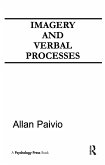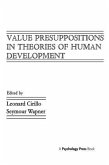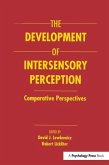- Broschiertes Buch
- Merkliste
- Auf die Merkliste
- Bewerten Bewerten
- Teilen
- Produkt teilen
- Produkterinnerung
- Produkterinnerung
The result of extensive scholarship and consultation with leading scholars, this text introduces students to twenty-four theorists and compares and contrasts their theories on how we develop as individuals. Emphasizing the theories that build upon the developmental tradition established by Rousseau, this text also covers theories in the environmental/learning tradition.
Andere Kunden interessierten sich auch für
![Theories of Development Theories of Development]() William CrainTheories of Development147,99 €
William CrainTheories of Development147,99 €![Imagery and Verbal Processes Imagery and Verbal Processes]() A. PaivioImagery and Verbal Processes194,99 €
A. PaivioImagery and Verbal Processes194,99 €![The Cambridge Handbook of Prosociality The Cambridge Handbook of Prosociality]() The Cambridge Handbook of Prosociality56,99 €
The Cambridge Handbook of Prosociality56,99 €![Learning to Live Learning to Live]() Beatrix Tudor-HartLearning to Live38,99 €
Beatrix Tudor-HartLearning to Live38,99 €![Value Presuppositions in Theories of Human Development Value Presuppositions in Theories of Human Development]() Value Presuppositions in Theories of Human Development40,99 €
Value Presuppositions in Theories of Human Development40,99 €![Concrete Human Psychology Concrete Human Psychology]() Wolff-Michael RothConcrete Human Psychology63,99 €
Wolff-Michael RothConcrete Human Psychology63,99 €![The Development of Intersensory Perception The Development of Intersensory Perception]() The Development of Intersensory Perception64,99 €
The Development of Intersensory Perception64,99 €-
-
-
The result of extensive scholarship and consultation with leading scholars, this text introduces students to twenty-four theorists and compares and contrasts their theories on how we develop as individuals. Emphasizing the theories that build upon the developmental tradition established by Rousseau, this text also covers theories in the environmental/learning tradition.
Produktdetails
- Produktdetails
- Verlag: Taylor & Francis
- 6th edition
- Erscheinungstermin: 28. Juli 2010
- Englisch
- Abmessung: 229mm x 152mm x 24mm
- Gewicht: 644g
- ISBN-13: 9780205810468
- ISBN-10: 0205810462
- Artikelnr.: 30630932
- Herstellerkennzeichnung
- Libri GmbH
- Europaallee 1
- 36244 Bad Hersfeld
- gpsr@libri.de
- Verlag: Taylor & Francis
- 6th edition
- Erscheinungstermin: 28. Juli 2010
- Englisch
- Abmessung: 229mm x 152mm x 24mm
- Gewicht: 644g
- ISBN-13: 9780205810468
- ISBN-10: 0205810462
- Artikelnr.: 30630932
- Herstellerkennzeichnung
- Libri GmbH
- Europaallee 1
- 36244 Bad Hersfeld
- gpsr@libri.de
William Crain
Introduction
Chapter 1 Early Theories: Preformationism, Locke, and Rousseau
Chapter 2 Gesell's Maturational Theory
Chapter 3 Ethological Theories: Darwin, Lorenz and Tinbergen, and Bowlby and Ainsworth
Chapter 4 Montessori's Educational Philosophy
Chapter 5 Werner's Organismic and Comparative Theory
Chapter 6 Piaget's Cognitive-Developmental Theory
Chapter 7 Kohlberg's Stages of Moral Development
Chapter 8 Learning Theory: Pavlov, Watson, and Skinner
Chapter 9 Bandura's Social Learning Theory
Chapter 10 Vygotsky's Social-Historical Theory of Cognitive Development
Chapter 11 Freud's Psychoanalytic Theory
Chapter 12 Erikson and the Eight Stages of Life
Chapter 13 Mahler's Separation/Individuation Theory
Chapter 14 A Case Study in Psychoanalytic Treatment: Bettelheim on Autism
Chapter 15 Schachtel on Childhood Experiences
Chapter 16 Jung's Theory of Adulthood
Chapter 17 Chomsky's Theory of Language Development 1This chapter was written in collaboration with Stephen Crain.
Chapter 18 Conclusion: Humanistic Psychology and Developmental Theory
epi A Developmental Perspective on the Standards Movement
Chapter 1 Early Theories: Preformationism, Locke, and Rousseau
Chapter 2 Gesell's Maturational Theory
Chapter 3 Ethological Theories: Darwin, Lorenz and Tinbergen, and Bowlby and Ainsworth
Chapter 4 Montessori's Educational Philosophy
Chapter 5 Werner's Organismic and Comparative Theory
Chapter 6 Piaget's Cognitive-Developmental Theory
Chapter 7 Kohlberg's Stages of Moral Development
Chapter 8 Learning Theory: Pavlov, Watson, and Skinner
Chapter 9 Bandura's Social Learning Theory
Chapter 10 Vygotsky's Social-Historical Theory of Cognitive Development
Chapter 11 Freud's Psychoanalytic Theory
Chapter 12 Erikson and the Eight Stages of Life
Chapter 13 Mahler's Separation/Individuation Theory
Chapter 14 A Case Study in Psychoanalytic Treatment: Bettelheim on Autism
Chapter 15 Schachtel on Childhood Experiences
Chapter 16 Jung's Theory of Adulthood
Chapter 17 Chomsky's Theory of Language Development 1This chapter was written in collaboration with Stephen Crain.
Chapter 18 Conclusion: Humanistic Psychology and Developmental Theory
epi A Developmental Perspective on the Standards Movement
1. Early Theories: Preformationism, Locke, and Rousseau 2. Gesell's Maturational Theory 3. Ethological Theories: Darwin, Lorenz, and Bowlby and Ainsworth 4. Montessori's Educational Philosophy 5. Werner's Organismic and Comparative Theory 6. Piaget's Cognitive-Developmental Theory 7. Kohlberg's Stages of Moral Development 8. Learning Theory: Pavlov, Watson, and Skinner 9. Bandura's Social Learning Theory 10. Vygotsky's Social-Historical Theory of Cognitive Development 11. Freud's Psychoanalytic Theory 12. Erikson and the Eight Stages of Life 13. Mahler's Separation/Individuation Theory 14. A Case Study in Psychoanalytic Treatment: Bettelheim on Autism 15. Schachtel on Childhood Experiences 16. Jung's Theory of Adulthood 17. Chomsky's Theory of Language Development 18. Conclusion: Humanistic Psychology and Developmental Theory. Epilogue: A Developmental Perspective on the Standards Movement.
Introduction
Chapter 1 Early Theories: Preformationism, Locke, and Rousseau
Chapter 2 Gesell's Maturational Theory
Chapter 3 Ethological Theories: Darwin, Lorenz and Tinbergen, and Bowlby and Ainsworth
Chapter 4 Montessori's Educational Philosophy
Chapter 5 Werner's Organismic and Comparative Theory
Chapter 6 Piaget's Cognitive-Developmental Theory
Chapter 7 Kohlberg's Stages of Moral Development
Chapter 8 Learning Theory: Pavlov, Watson, and Skinner
Chapter 9 Bandura's Social Learning Theory
Chapter 10 Vygotsky's Social-Historical Theory of Cognitive Development
Chapter 11 Freud's Psychoanalytic Theory
Chapter 12 Erikson and the Eight Stages of Life
Chapter 13 Mahler's Separation/Individuation Theory
Chapter 14 A Case Study in Psychoanalytic Treatment: Bettelheim on Autism
Chapter 15 Schachtel on Childhood Experiences
Chapter 16 Jung's Theory of Adulthood
Chapter 17 Chomsky's Theory of Language Development 1This chapter was written in collaboration with Stephen Crain.
Chapter 18 Conclusion: Humanistic Psychology and Developmental Theory
epi A Developmental Perspective on the Standards Movement
Chapter 1 Early Theories: Preformationism, Locke, and Rousseau
Chapter 2 Gesell's Maturational Theory
Chapter 3 Ethological Theories: Darwin, Lorenz and Tinbergen, and Bowlby and Ainsworth
Chapter 4 Montessori's Educational Philosophy
Chapter 5 Werner's Organismic and Comparative Theory
Chapter 6 Piaget's Cognitive-Developmental Theory
Chapter 7 Kohlberg's Stages of Moral Development
Chapter 8 Learning Theory: Pavlov, Watson, and Skinner
Chapter 9 Bandura's Social Learning Theory
Chapter 10 Vygotsky's Social-Historical Theory of Cognitive Development
Chapter 11 Freud's Psychoanalytic Theory
Chapter 12 Erikson and the Eight Stages of Life
Chapter 13 Mahler's Separation/Individuation Theory
Chapter 14 A Case Study in Psychoanalytic Treatment: Bettelheim on Autism
Chapter 15 Schachtel on Childhood Experiences
Chapter 16 Jung's Theory of Adulthood
Chapter 17 Chomsky's Theory of Language Development 1This chapter was written in collaboration with Stephen Crain.
Chapter 18 Conclusion: Humanistic Psychology and Developmental Theory
epi A Developmental Perspective on the Standards Movement
1. Early Theories: Preformationism, Locke, and Rousseau 2. Gesell's Maturational Theory 3. Ethological Theories: Darwin, Lorenz, and Bowlby and Ainsworth 4. Montessori's Educational Philosophy 5. Werner's Organismic and Comparative Theory 6. Piaget's Cognitive-Developmental Theory 7. Kohlberg's Stages of Moral Development 8. Learning Theory: Pavlov, Watson, and Skinner 9. Bandura's Social Learning Theory 10. Vygotsky's Social-Historical Theory of Cognitive Development 11. Freud's Psychoanalytic Theory 12. Erikson and the Eight Stages of Life 13. Mahler's Separation/Individuation Theory 14. A Case Study in Psychoanalytic Treatment: Bettelheim on Autism 15. Schachtel on Childhood Experiences 16. Jung's Theory of Adulthood 17. Chomsky's Theory of Language Development 18. Conclusion: Humanistic Psychology and Developmental Theory. Epilogue: A Developmental Perspective on the Standards Movement.








